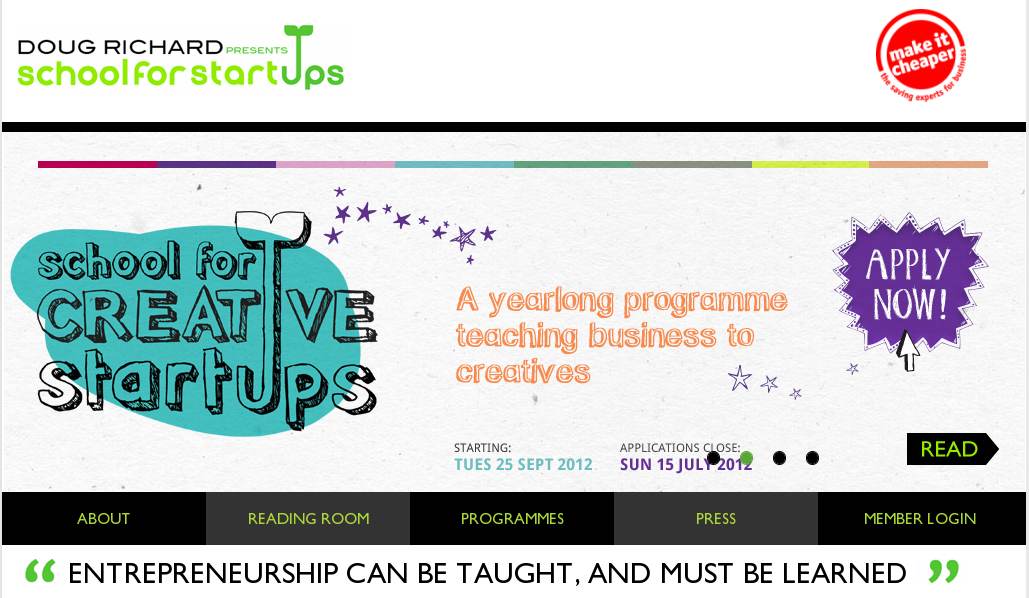A Conversation with Doug Richard former Dragon and Founder of School for Startups
Posted on May 04, 2012


Bio: For the few readers out there who have not heard of Doug Richard, he is a serial entrepreneur and acclaimed public speaker who first came to prominence as a Dragon in the first two series of Dragons’ Den. In 2006 Doug received an honorary Queen’s Award for Enterprise Promotion for his work promoting, developing and helping entrepreneurs. Through his latest venture, School for Startups, he has delivered instruction to more than 10,000 business owners with help from universities, public institutions like the British Library and philanthropic organizations like the Royal Institute of Great Britain. In 2010 Richard received the Enterprise Educator of the year award from the National Council on Graduate Employment for his work through School for Startups with UK Universities. We thought to ask him to do an expert interview for Pimp My Cause when one of our volunteers attended School for Startup’s free Web Fueled Business event in Liverpool and was inspired by Doug’s vision of entrepreneurship as a force for good.
Paul Skinner: Many people know you through your participation in the Dragons’ Den - how did your participation in the show affect your thinking about entrepreneurship?
Doug Richard: For the two years that I was on Dragons’ Den I learnt to make the distinction between product and pitch. Whilst you can’t make a bad product good, it is possible to coach entrepreneurs lacking in skills to become better at running a business.
However, there is very little training out there for those who want to learn how to start up - so I started School for Startups to fill this gap.
Paul: You have mentored more than 10,000 businesses, most recently through the School for Startups. What would you say are the top three things that social entrepreneurs, or charity leaders developing new business activities to support their goals should be thinking about in 2012?
Doug: Creating a successful social enterprise is a real feat and I have a huge admiration for social entrepreneurs. My first piece of advice for a social enterprise is the same as for any new business - start with one key, easy to define but remarkable product or service to wrap a self-sustaining business model around.
Secondly: branch out online. In 2012 we are seeing better connectivity than ever in the UK with the expansion of superfast broadband areas. Regardless of the size of your business, or where it is in the country, the web allows you to instantly have the potential to reach a global customer base and you must learn to exploit that.
Thirdly: harness social media. Social entrepreneurs should take some time to understand their customer or donor base. Once you know exactly who they are, what they like and where they live, then you can find relevant Facebook groups, Twitter hashtags and other online hubs where interaction will help to build your business.
Paul: In your Entrepreneur’s Manifesto you make a powerful case for opening the UK up to more contribution from entrepreneurs, not just in terms of wealth creation, but also in terms of finding new ways to improve social service delivery. What advice would you give to a social entrepreneur who wants government to recognize, support and take advantage of their efforts to make a positive societal contribution?
Doug: The government are looking to fund social enterprises that create cost effective sustainable solutions to social problems. They have launched an initiative called Big Society Capital - a fund of £600m for charities, social enterprises and community groups.
But this isn’t philanthropy – those encouraged to invest by the fund will still expect a return – and so the best way to make a big positive societal contribution is still from the platform of a successful, self-sustaining business.
Paul: At this point in our interviews, we always ask our interviewee to pick one of our causes to give some spontaneous advice, suggestions or ideas to. Which of our causes would you like to pick out and why?
Doug: The bloomtrigger project has a great idea with their ‘bloom’ currency and I am impressed by the commitment of Peer Productions to deliver community arts projects.
Paul: And what advice would you give them?
Doug: I would encourage the bloomtrigger project to continue to think creatively about the ways they can reach their market through social media. Increasing the visibility of a customer’s philanthropic activities to their peers could trigger an increase in this donation behaviour.
Peer Productions is a great example of a business in the UK that is using creativity for good. They must continue to wrap a sustainable business model around their idea and will then be able to deliver more projects to have an even more positive impact on the community.
Doug’s next venture will be the Creative Country Business, a two-day hands-on training course and free e-learning content package taking place on the 11-12 June at the Hilton Hotel, Cobham. Find out more at www.creativecountrybusiness.com